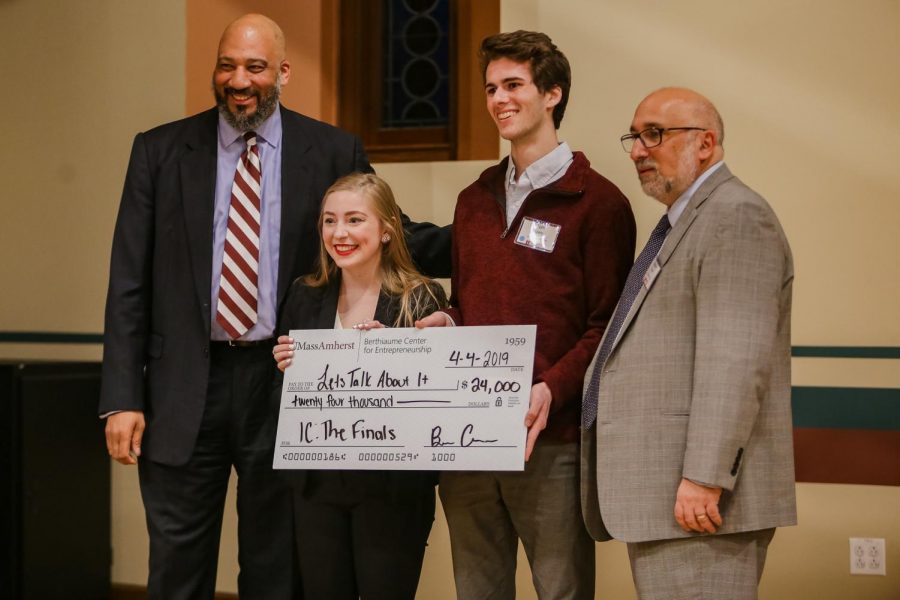A venture start-up aimed at addressing mental health in schools was awarded the top prize of $24,000 at the Isenberg Innovation Challenge, a four-part entrepreneurship competition that helps fund the ventures of young entrepreneurs. As part of the final round, each team was awarded $1,000 for their hard work, while a remaining $59,000 is allocated to the “top” teams determined by judges.
Founded by University of Massachusetts students Ashley Olafsen and Tom Leary, Let’s Talk About It: The Workshop Series for Students is an online curriculum aimed toward providing educational videos on mental health topics such as body-image issues, self-esteem and relationship pressures to students, teachers and mental health experts.
According to the two, 37 percent of teenagers will drop out of school due to mental health-related issues. Their start-up plans to “challenge” this statistic.
Each “episode” of the series features Olafsen sitting in a “home-like” setting, sometimes talking to a guest speaker.
Already, the two have gotten 12 schools to partner with their online curriculum, where they charge $500 per 100 students annually.
The two asked for $33,000 during their pitch for data acquisition, attending educational conferences and hiring two subcontractors to work with them this summer. The judges, several entrepreneurs and legal experts thought it had great potential but were weary of the fact that it had no student feedback.
Using the money awarded to them, the two plan to exhibit at the education conferences.
“At the conferences, when we exhibit, we are talking to decision makers like principals and wellness officers directly. So it’s less about learning I think, even we are learning, and more about relationship building,” said Olfasen.
The pair have exhibited at two conferences, one in California and one in Massachusetts.
Coming in with the second highest prize was Renovare, a wound-healing technology start-up that’s aimed toward the elderly was awarded $20,000.
Founded by UMass students E.J. Chen, George Ryan, Avi Benmayor and Kevin Cutinella, the start-up technology uses small micropumps embedded within a bandage that controls several microbubbles in the membrane of the bandage, which compress the cells, causing them to replicate faster. The bandages come in two forms, in a dissolvable adhesive for elderly users and one without.
According to the team, ordinary bandages can take 30 days to heal a wound fully whereas with Renovare, they can cut that wait time in half.
Although the teams main focus is on the elderly, they are not averse to expanding their market toward physical laborers, athletes and soldiers, which they predict to be 20 million people in total.
In terms of the elderly market, the team will be focusing on the 4 million elderly people in the United States that spend $2.2 billion a year on bandages. In order to reach that vast market, the team plans to partner with pharmaceutical giants Johnson & Johnson and McKesson to license their products and distribute them to hospitals, retail stores and nursing homes.
However, competition is tight for the young entrepreneurs. Small medical technology that has been traditional use for decades such as Neosporin which protects against infections, hyperbaric oxygen therapy for large wounds and regular bandages are used already. The team markets Renovare as a combination of all three.
“We’re treating wounds, protecting them and healing them faster, whether we are treating wounds that are too small or too big for bandages or hyperbaric oxygen therapy,” said Ryan.
In terms of costs, the team believes they can best be finished with the prototyping and tissue testing of Renovare, which will cost them $10,000. Another $20,000 will go toward FDA approval, along with an additional $20,000 toward animal trials as well as a to-be-determined cost toward patenting.
Although the science behind the start-up showed promise to the judges, a major concern expressed was the amount of competition that has already been set in stone for wound-healing technology, as well as the amount of similar projects to Renovare that have failed. However, their scientific proof that showed Renovare technology sped up cell replication was enough for the judges to place them in the top four.
The last two ventures, Organacin Scientific, a start-up which uses a protein to fight against antibiotic-resistant bacteria, and Microbacterial Identifier: iSPY, a machine used to identify bacteria, were each awarded $7,500.
Organacin Scientific, founded by biochemistry majors Mathew Mitchell, Griffin O’Driscoll and Joshua Mallon, have worked with UMass researcher Dr. Margaret Reily in her lab to find ways proteins can destroy bacteria on a “one-to-one” basis, making the body less likely to be resistant to antibiotics.
The start-up, in their plans to grow, hope to use a merit-based business model where companies come to them with agricultural problems in relation to bacteria and for a small fee, will provide the necessary protein.
“As that protein works, that company will provide a licensing agreement,” said Mallon. “As that licensing agreement progresses, we will not only be paid to develop proteins, we will be paid on wellness-based milestones in such a way if that market product were related to that product, we will get paid in royalties.”
The youngest team, iSPY, consisting of all freshman female STEM majors, Anna Maria Miller, Hayley Green and Jeng-Yu Chou, planned on using their money to expand the accuracy of their model.
The end goal is to create a user-friendly web application where individuals can send screenshots of bacteria from their microscope into an online database that can identify it accurately.
Although they may have not won the “big” prize money, the trio doesn’t plan to stop here.
“You learn so much from this and we’ve only been in it for two months, imagine what we can do in a year,” said Green.
The remaining venture teams, Deadeye and Driving my ADHD, were awarded $1,000.
Alvin Buyinza can be reached at [email protected] followed on Twitter at @abuyinza_news.




















